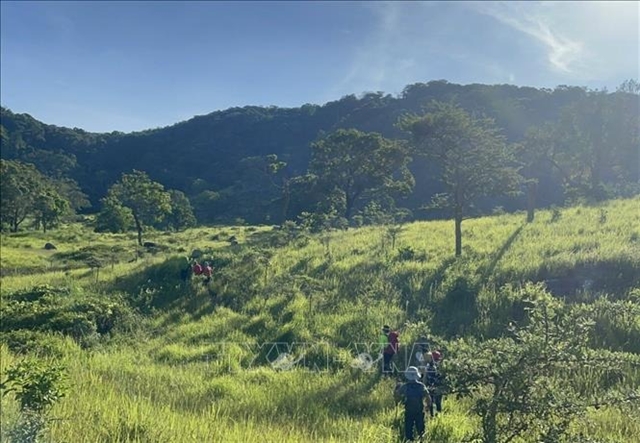 Society
Society


|
| Tourists explore the forest ecosystem at the Núi Chùa National Park in Ninh Thuận Province. Việt Nam is striving to reverse biodiversity degradation. - VNA Photo |
HCM CITY - Việt Nam is striving to mitigate the alarming risk of biodiversity loss and foster conservation of nature and ecosystems.
According to the United Nations Development Programme (UNDP), Việt Nam is among the countries with the richest biodiversity in the world.
It has a range of ecosystems like mountains, tropical forests, limestone mountains, and coasts, is home to over 100 bird species and over 10 percent of its plant species is endemic, the UNDP said.
But experts from the World Wildlife Fund (WWF) Việt Nam have warned that its biodiversity is declining.
Phạm Minh Thảo, director of WWF Việt Nam's programme development, said the decline in ecosystems affects food chains, energy, infrastructure, transportation, logistics, and people's lives.
The main causes of biodiversity degradation are population growth, land use change, unsustainable exploitation of natural resources, global climate change, and pollution.
From a biodiversity management perspective, policies and the legal system lack effectiveness and efficiency.
Awareness of conservation at all levels of government and among the public is limited.
Hoàng Thị Thanh Nhàn, deputy director of the Ministry of Natural Resources and Environment’s Natural Conservation and Biodiversity Department, said halting the speed of biodiversity decline in Việt Nam would also contribute to global objectives.
The goal of the National Biodiversity Strategy for until 2030 is to increase the area of protected and restored ecosystems, conserve and sustainably use biodiversity to contribute to socio-economic development and achieve a green economy and proactively adapt to climate change.
Along with it, the government also issued a plan for strengthening prevention and control of biodiversity-related crimes also for until 2030 by enforcing laws, especially by reducing the hunting, trading and consumption of wild animals and plants.
In 2024 the Department of Nature Conservation and Biodiversity will evaluate 15 years of implementation of the 2008 Law on Biodiversity.
This will lay the groundwork for proposing amendments to it, ensuring unified state management.
The department will review and propose improvements to policies, laws, mechanisms, and management measures for protecting natural landscapes and protected areas outside reserves.
With the adoption of the Kunming – Montreal Global Biodiversity Framework in December 2022, which aims to restore ecosystems and reverse global biodiversity loss, the implementation of this global commitment is a driving force for Việt Nam to further prevent biodiversity decline. - VNS




